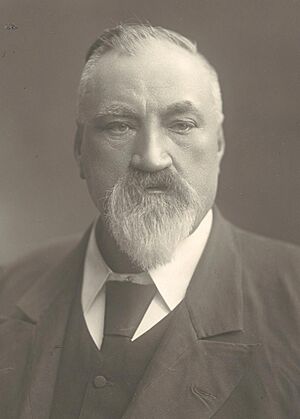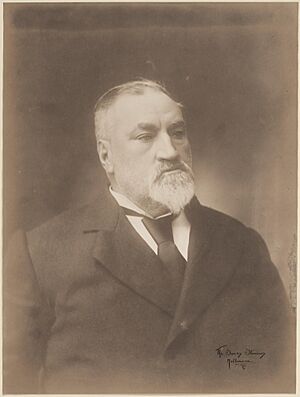Thomas Playford II facts for kids
Quick facts for kids
Thomas Playford
|
|
|---|---|
 |
|
| 17th Premier of South Australia | |
| In office 11 June 1887 – 27 June 1889 |
|
| Monarch | Victoria |
| Governor | Sir William Robinson Earl of Kintore |
| Preceded by | John Downer |
| Succeeded by | John Cockburn |
| In office 19 August 1890 – 21 June 1892 |
|
| Monarch | Victoria |
| Governor | Earl of Kintore |
| Preceded by | John Cockburn |
| Succeeded by | Frederick Holder |
| Leader of the Government in the Senate | |
| In office 5 July 1905 – 31 December 1906 |
|
| Preceded by | Josiah Symon |
| Succeeded by | Robert Best |
| In office 24 September 1903 – 27 April 1904 |
|
| Preceded by | Richard O'Connor |
| Succeeded by | Gregor McGregor |
| Minister for Defence | |
| In office 5 July 1905 – 24 January 1907 |
|
| Prime Minister | Alfred Deakin |
| Preceded by | James Whiteside McCay |
| Succeeded by | Thomas Ewing |
| Senator for South Australia | |
| In office 30 March 1901 – 31 December 1906 |
|
| Leader of the Opposition in South Australia | |
| In office 1889–1890 |
|
| Preceded by | John Cockburn |
| Succeeded by | Frederick Holder |
| In office 1887–1887 |
|
| Preceded by | Jenkin Coles |
| Succeeded by | John Downer |
| Personal details | |
| Born | 26 November 1837 Bethnal Green, London, England |
| Died | 19 April 1915 (aged 77) Kent Town, South Australia |
| Spouse |
Mary Jane Kinsman
(m. 1860) |
| Children | 11 |
| Relatives | Thomas Playford I (father), Thomas Playford IV (grandson), John Henry Sexton (son-in-law) |
Thomas Playford (born 26 November 1837 – died 19 April 1915) was an important Australian politician. He served twice as the Premier of South Australia, which is like being the leader of the state government. He was Premier from 1887 to 1889 and again from 1890 to 1892. Later, he became a Senator for South Australia in the national parliament from 1901 to 1906. He also held a big job as the Minister for Defence from 1905 to 1907, looking after Australia's military.
Contents
Early Life and Moving to Australia
Thomas Playford was born in London, England, in 1837. When he was about seven years old, in 1844, his family moved to Adelaide, South Australia. His father was the Reverend Thomas Playford. Before he started his career in politics, Thomas Playford II worked as a farmer.
Thomas Playford's Time in South Australian Politics
Thomas Playford was first elected to the Parliament of South Australia in 1868. He represented the area called Onkaparinga. People often called him "Honest Tom" because he was very direct and always spoke his mind.
Sometimes, being so direct caused him trouble. For example, he once made a comment in parliament that some people didn't like. This led to him losing his seat in the 1871 election.
- Returning to Parliament: Playford returned to parliament in 1875, representing East Torrens.
- Crown Lands Commissioner: He worked as a Commissioner for Crown Lands and Immigration, helping to manage public land.
- Becoming Premier: Even after losing his seat again in 1887, he quickly won another one for Newcastle. By mid-1887, he became the Premier and Treasurer of South Australia. He held these roles for two years.
- First Major Achievement: During his first time as Premier, he created the first organized system for taxes on imported goods in South Australia. This was a very important step for the colony's economy.
He became Premier for a second time in 1890, again serving as both Premier and Treasurer. This term also lasted for two years. He was praised for greatly reducing the colony's debt, which meant the government owed less money. He spent a lot of this second term traveling in India.
- Working with Charles Kingston: In 1893, Charles Kingston became Premier with support from the Labor Party. Kingston asked Playford to be his Treasurer.
- Agent-General in London: In 1894, Playford moved to London to work as the Agent-General for South Australia. This job involved representing South Australia's interests in the United Kingdom.
- Return to Parliament: He returned to South Australia in 1898 and was elected to parliament again for Gumeracha.
- Bringing Down the Government: Later that year, he disagreed with Charles Kingston's government over a plan that might have weakened the power of the Legislative Council. Playford voted against his own government, which caused Kingston's government to fall.
- Helping to Create Australia: Thomas Playford was also involved in planning the Federation of Australia. This was the process of joining all the separate colonies into one country. He even suggested the name "Commonwealth of Australia" for the new nation.
Thomas Playford's Federal Politics Career
After Australia became a federation, Playford was elected as a Senator for South Australia in the first national election in 1901. He was part of the Protectionist Party, which believed in protecting local industries.
- Leader in the Senate: In 1903, he became the Leader of the Government in the Senate for seven months under Prime Minister Alfred Deakin. This meant he was the main government spokesperson in the Senate.
- Minister for Defence: In 1905, he became the Minister for Defence, a role he held for 18 months.
- Election Defeat: He lost his Senate seat in the 1906 federal election. He was the first serving Minister to ever lose an election while in office. His time as a Senator ended on December 31, 1906.
- Later Attempts: Playford tried to get back into the Senate in 1910 but was not successful.
Death
Thomas Playford passed away in Kent Town, Adelaide, on April 19, 1915, at the age of 77.
Family Life
Thomas Playford married Mary Jane Kinsman in 1860. They had eleven children together: five sons, five daughters, and one adopted daughter.
- Notable Relatives:
- His eldest daughter, Annie, married the Reverend John Henry Sexton.
- His second daughter, Eliza, married Harry J. Tuck, whose sister was the famous painter Marie Tuck.
- Thomas Playford's grandson, Sir Thomas Playford, also became a very long-serving Premier of South Australia.
Images for kids
| Assembly seats | ||
|---|---|---|
| Preceded by William Milne |
Member for Onkaparinga 1868–1871 Served alongside: William Townsend, Friedrich Krichauff |
Succeeded by William Bundey |
| Preceded by George Stevenson |
Member for East Torrens 1875–1887 Served alongside: Edwin Smith, David Murray |
Succeeded by Saul Solomon |
| Preceded by Patrick Coglin |
Member for Newcastle 1887–1890 Served alongside: Thomas Burgoyne |
Succeeded by Joseph Hancock |
| Preceded by Saul Solomon |
Member for East Torrens 1890–1894 Served alongside: Edwin Smith, Frederick Coneybeer |
Succeeded by David Packham |
| Preceded by William Randell |
Member for Gumeracha 1899–1901 Served alongside: Robert Homburg |
Succeeded by William Jamieson |
| Political offices | ||
| Preceded by David Bower |
Commissioner of Public Works 1884–1885 |
Succeeded by Jenkin Coles |
| Preceded by Jenkin Coles |
Leader of the Opposition of South Australia 1887 |
Succeeded by John Downer |
| Preceded by John Downer |
Premier of South Australia 1887–1889 |
Succeeded by John Cockburn |
| Preceded by John Cockburn |
Leader of the Opposition of South Australia 1889–1890 |
Succeeded by Frederick Holder |
| Premier of South Australia 1890–1892 |
||
| Parliament of Australia | ||
| New division | Senator for South Australia 1901–1906 |
Succeeded by William Russell Joseph Vardon James O'Loghlin |
| Political offices | ||
| Preceded by Richard O'Connor |
Vice-President of the Executive Council 1903 – 1904 |
Succeeded by Gregor McGregor |
| Preceded by James Whiteside McCay |
Minister for Defence 1905 – 1907 |
Succeeded by Thomas Ewing |
| Diplomatic posts | ||
| Preceded by John Cox Bray |
Agent-General for South Australia 1894–1898 |
Succeeded by John Cockburn |
 | Percy Lavon Julian |
 | Katherine Johnson |
 | George Washington Carver |
 | Annie Easley |




